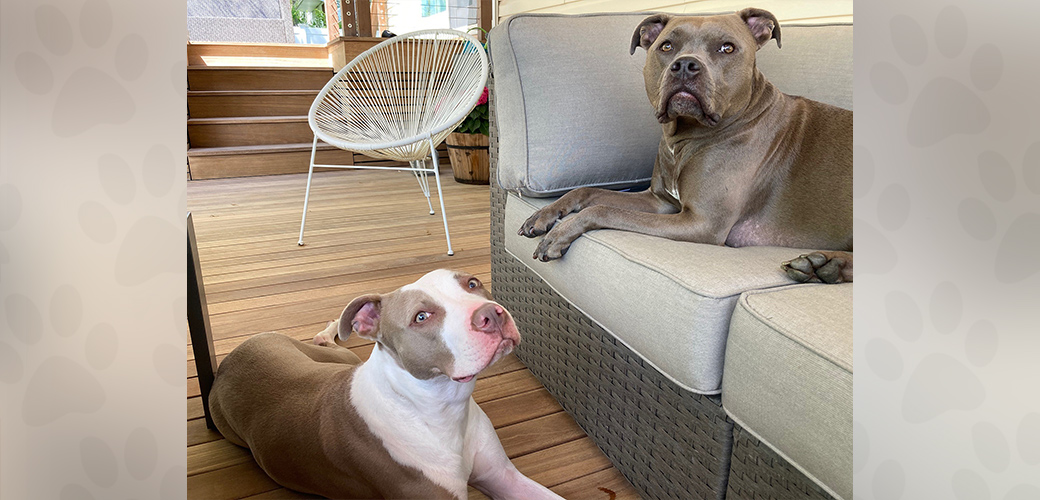Debunking Myths About Fostering Large Dogs


During the month of October, we’re taking time to celebrate our rescued canine counterparts and asking our amazing supporters—like you—to consider temporarily opening your heart and home to foster a dog in need.
An important step in the journeys of countless shelter animals is time in foster homes, and sadly, many large dogs are overlooked in the shelter due to common concerns and misconceptions.
Fostering is an incredible opportunity for dogs to learn what life in a loving home is like and many fosters provide invaluable care for dogs that may have medical or behavioral needs. Fostering is an incredibly important step for many dogs, and that’s why we’re debunking some common myths and misconceptions about fostering a large dog!
1. “My apartment or home is too small to foster dogs, especially larger ones. I don’t have enough space!”
While a big dog may take up more space when snuggling on your bed or couch, you don’t have to have a large house and a yard to foster a dog. While those things are a plus, foster dogs just need someone to make sure they can stretch their legs when they need to, provide their daily essential care and help them enjoy each day as they wait to find loving homes.
2. “I can’t foster a larger dog because I have other pets.”
Every dog is completely unique! Which means that some enjoy the company of other animals, and others don’t. Fortunately, animal rescues and shelters take matchmaking as seriously for their fosters as they do for their adopters. So, while your home may not be the right foster fit for every large dog, it doesn’t mean that there’s not an eager pup who would love the chance to join a home with other dogs or cats.
3. “I have no idea how to help a dog adjust to a home. How can I help them?”
Dogs get invaluable experience when they live with a foster caregiver because it gives them the opportunity to learn what it’s like to live in a home. While you’ll need to be there for your foster dog to help them mind their manners and adjust, you won’t be doing it alone! Staff at your local shelter or rescue will stay in close contact with you, providing you with any training you may need and helping you along the way to guide you in welcoming your foster dog home and helping them thrive in your care and prepare to find a loving home.
4. “A large dog is too energetic for me. I also worry that they are too strong.”
Dogs of all sizes can have varying dispositions and energy levels, much like people! When you consider fostering a dog, it helps to think about the level of activity you and your family may enjoy on a normal day, and to tell the staff at your local shelter so they can help match you with a foster dog who is a good fit. The same thing applies when considering the strength of a potential foster dog. Sharing household information and asking questions are important tools in the foster matchmaking process. Are you willing and able to provide a lot of exercise, such as long walks, hikes or running each day, or do you prefer a ‘couch potato’ who likes to slowly meander around the block? Are you comfortable walking a strong dog that may pull? Or do you feel more confident with a dog who is calmer on-leash, regardless of size? As you learn more about your foster dog while they are in your care, your observations will be very helpful to your local shelter.
5. “I have kids, large dogs would be unsafe.”
This is another misconception that forgets that not all dogs are the same. While some dogs may be fearful or wary around children, others adore having a small pal to run around outside or snuggle with. The foster team at your local shelter will be able to match you with a foster dog who best fits in with your family. Plus, with supervision, fostering offers children an opportunity to learn how to respect and care for a dog, play with and socialize them.
6. “I can’t take on the financial responsibility. I just don’t have the money to care for a large dog.”
Many foster programs across the country, including the ASPCA’s, cover the cost of care, food, supplies and toys. It’s free—and fun—to have a large cuddle buddy getting cozy at your house for a bit! Plus, you’re truly helping a dog in need.
With those misconceptions out of the way, we hope you consider opening your heart and home to a large dog in need. The ASPCA Adoption Center in Manhattan is in critical need of large dog fosters. So if you live in the tri-state area and are ready to lend a paw, please apply to become a foster caregiver today!
You can also become an ASPCA dog foster in the Asheville, North Carolina area or in the Columbus, Ohio area. Not near these locations? Help foster at a shelter near you!
Source: Read Full Article